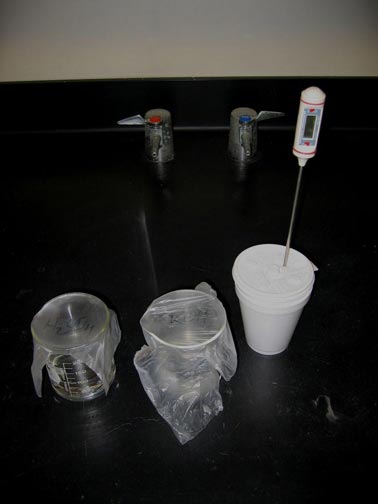Why acid/base neutralization reactions are exothermic
 The neutralization of a strong acid with a strong base is examined and found to always add heat to the surroundings.
The neutralization of a strong acid with a strong base is examined and found to always add heat to the surroundings.
Ingredients: potassium hydroxide, sulfuric acid, thermometer
Procedure: A complete recipe follows.
1. Pour a 1.0 molar solution of sulfuric acid into an insulated container.
2. Measure the temperature of the solution.
3. Add an equal volume of 1.0 molar solution of potassium hydroxide and stir.
4. Measure the temperature of the mixture.
Understanding: We have become familiar with acid/base neutralization reactions. The reaction between sulfuric acid and potassium hydroxide leads to the formation of salt and water
H2SO4(aq) + 2 KOH(aq) → K2SO4(aq) + 2 H2O(l)
and heat! The reaction is exothermic. How can we compute the enthalpy change on reaction?One approach is to use the enthalpies of formation of the various species to determine the heat of reaction. Unfortunately, when we look to our table of data for enthalpies of formation, we don't find the enthalpy of formation of H2SO4(aq). What gives?
Before computing the heat of reaction, we need to simplify our expression for the acid/base neutralization reaction by writing the net ionic equation
H+(aq) + OH-(aq) → H2O(l)
We can find the heats of formation at standard state and 25C for the solvated proton, ΔHfo=0 kJ, the solvated hydroxide ion, ΔHfo=-229.99 kJ, and the water molecule, ΔHfo=-285.83 kJ. Using Hess's Law we can compute the heat evolved in the neutralization reaction run at constant pressure
ΔHo = ΔHfo[H2O(l)] - ( ΔHfo[H+(aq)] + ΔHfo[OH-(aq)] ) = -55.84 kJ
As we observe in our experiment, the neutralization reaction is exothermic.
The heat of reaction for neutralization of a strong acid with a strong base
Question: The net ionic equation for the neutralization reaction is quite general. It is in no way specific to the particular neutralization of sulfuric acid with potassium hydroxide.Would the heat of reaction for the neutralization of hydrochloric acid with sodium hydroxide, or any strong acid with any strong base, be the same? How does that make sense?
You can check your answers here.